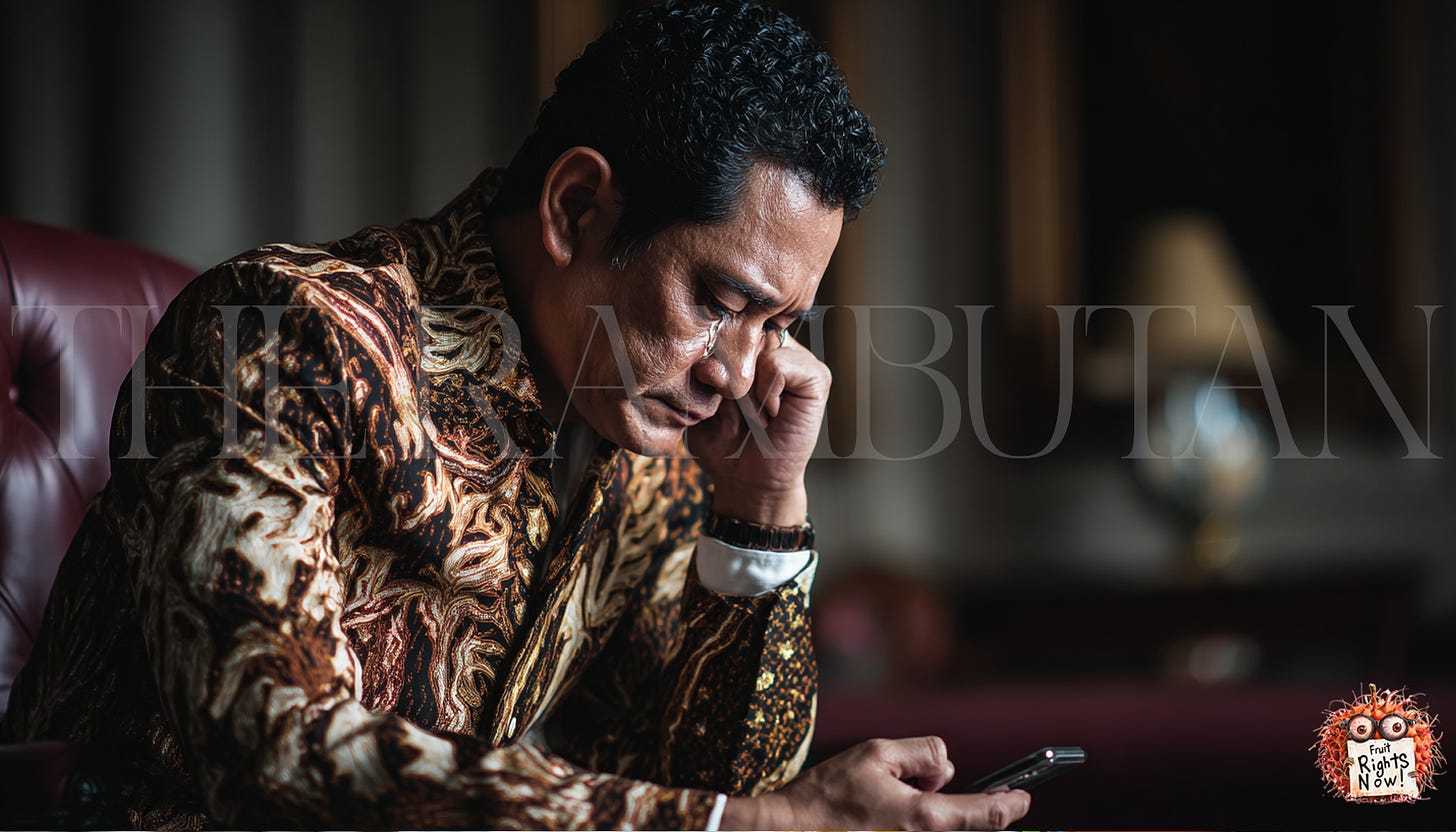DPR Members Demand ‘Emotional Labor Allowance’ After Being Criticized Online
Indonesia’s DPR members are requesting a new emotional labor allowance to cope with online criticism. The public isn’t exactly buying it.
JAKARTA — Members of Indonesia’s House of Representatives (DPR) have submitted a formal request to the Ministry of Finance for the introduction of a new monthly “Emotional Labor Allowance” to compensate for the psychological burden of public criticism, particularly on social media platforms.
The request, described in a 12-page letter, cites rising stress levels among lawmakers due to “unfiltered tweets, mean Instagram comments, and hurtful TikTok duets.” Lawmakers argue that the current compensation package, which includes housing allowances, communication stipends, and subsidized rice, does not fully cover the emotional costs of modern political life.
“We suffer daily,” said one DPR member, adjusting his sunglasses while boarding a taxpayer-funded business-class flight to Bali for a “listening session.” “Just yesterday someone in my constituency called me ‘lazy’ on Twitter. Do you know what that does to a person’s spirit?”
The proposed allowance, set at Rp 10 million per month per member, is intended to fund personal coping tools such as aromatherapy diffusers, customized meditation playlists, and silent retreats in Ubud.
Supporters of the proposal say it is long overdue. “We are not robots,” said Komisi VII member Adi Santoso “When people accuse us of doing nothing, they ignore the emotional toll of being accused of doing nothing.”
A draft of the proposal includes optional add-ons, including:
Rp 2 million “TikTok Criticism Hazard Bonus”
Rp 1.5 million allowance for soothing herbal teas
Rp 3 million voucher for monthly “personal grounding therapy”
Rp 500,000 cash top-up for journaling pens
Asked whether this new allowance might create unnecessary bureaucracy, Finance Ministry officials said the form would be streamlined and could be bundled with the Intensive Communication Allowance, which already supports such related activities as “maintaining composure on WhatsApp.”
News of the allowance request spread rapidly online, where ordinary citizens, many of whom earn less in a month than a DPR member spends on coffee, responded with a mixture of disbelief and sarcasm.
“I stubbed my toe this morning and a Go-Jek driver honked at me. Where’s my Emotional Labor Allowance?” tweeted one netizen. “Maybe I’ll run for office just to afford therapy,” posted another.
Activist groups have been less amused. Watchdog NGO Transparansi Tanpa Basa-Basi (TTBB) called the proposal “morally absurd” and questioned whether lawmakers understood the concept of public service at all.
“In other countries, criticism is part of the job. In Indonesia, it’s apparently a workplace hazard worthy of state compensation,” said TTBB director Wulan Hartanto. “If DPR members want emotional safety, they should try working retail.”
Despite public backlash, several DPR leaders remained defiant. “Let the people laugh,” said Deputy Speaker H. Raka Widjaja. “They don’t know what it’s like to scroll through your mentions and see a meme of your face on a nasi bungkus wrapper.”
Insiders say the proposal has a strong chance of passing quietly, most likely bundled into the next omnibus regulation on “Work-Life Balance and Representative Wellness,” currently being drafted with minimal public consultation.
Economists estimate the new allowance would cost taxpayers approximately Rp 6 billion per year. When asked whether the money could instead be used to improve public education or healthcare, one DPR staffer responded, “Those sectors don’t have to read the comments.”
Back in Bali, lawmakers wrapped up the first informal “Resilience Retreat,” a pilot program tied to the proposed fund. Activities included beach yoga, coconut therapy, and a workshop on “Reframing Public Hatred as a Form of Love.”
In the closing ceremony, a senior DPR member gave a speech from a poolside cabana.
“They mock us now,” he said. “But one day, they’ll understand. We do not suffer less because we wear batik. We suffer in silence. But soon, with allowance.”
We write the headlines that haven’t happened yet, but probably will. Subscribe to The Rambutan for Southeast Asia’s sharpest fake news.




